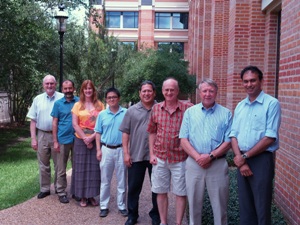Nov 5 2013
Rice University announced today it has established a new academic department to capitalize on the university’s research in materials science and nanotechnology.
 Members of Rice’s new Materials Science and NanoEngineering Department, from left: Wade Adams, Robert Vajtai, Program Manager Leah Benard-Boggs, Jun Lou, Enrique Barrera, Boris Yakobson, Ned Thomas and Pulickel Ajayan. Photo by Doni Soward
Members of Rice’s new Materials Science and NanoEngineering Department, from left: Wade Adams, Robert Vajtai, Program Manager Leah Benard-Boggs, Jun Lou, Enrique Barrera, Boris Yakobson, Ned Thomas and Pulickel Ajayan. Photo by Doni Soward
The Department of Materials Science and NanoEngineering, part of Rice’s George R. Brown School of Engineering, will be led by Pulickel Ajayan, Rice’s Benjamin M. and Mary Greenwood Anderson Professor in Mechanical Engineering and Materials Science and of chemistry.
“The creation of this department recognizes our leadership and successes in materials science, which span a range of disciplines at the university,” said Rice President David Leebron.
New Department Chair Ajayan said, “We believe materials science and nanotechnology are increasingly important as the world demands products that are smaller, lighter and stronger — often all at once — and more useful. Our work, and that of our students here and out in the world, will provide the basic blocks upon which the future is built.”
The new department will include a group of professors who have been part of Rice’s Department of Mechanical Engineering and Materials Science. Mechanical Engineering will become a separate department chaired by Professor Andrew Meade and will continue its work in robotics, control systems, smart structures, aerodynamics, fluid mechanics and heat transfer.
Professors from other engineering departments and Rice’s Wiess School of Natural Sciences will bring their skills in chemistry, nanophotonics, bioengineering, theoretical biological physics, advanced optics, condensed matter physics and more to the Department of Materials Science and NanoEngineering. Emilie Ringe, a researcher in the electron microscopy group in the Natural Science and Metallurgy Department at Cambridge University, will join the department as an assistant professor in January.
The Department of Materials Science and NanoEngineering will offer the bachelor’s, master’s and doctorate degrees in materials science that Rice has awarded for more than 30 years.
“Materials science at Rice has a great reputation, and that can only get better with a department dedicated to its advancement,” said Edwin “Ned” Thomas, a materials scientist and the William and Stephanie Sick Dean of the School of Engineering. “The field touches many departments and disciplines at Rice, and it makes sense to give it an academic home, an educational anchor.
“Materials science has always been and continues to be a key component of new technology and it’s important to the country and the economy. President Obama’s Materials Genome Initiative (MGI) is a good indicator of how seriously the nation takes what we do.”
Rice has been chosen by the White House to host an MGI regional workshop next April 28-29 for academia, industry and government.
Materials science research at Rice has won international recognition. In 2010, a Times Higher Education survey declared Rice No. 1 in the world for materials science. A 2013 study by the Max Planck Society in Germany also put Rice at No. 1 based on citations of research papers.
In recent years, Rice materials scientists have conducted successful research on electronic devices and sensors; composites and lightweight, high-strength materials; energy storage and conversion; environmental remediation and corrosion protection; solar power and photonic applications; and hardened materials for military and other uses.
“Leaders in industry and academia already sit up and take notice of world-class research by our faculty,” said George McLendon, Rice’s Howard R. Hughes Provost. “Students who earn degrees in the new department will have a distinct advantage as they build their careers and help change the world.”
The new department’s home office will be located in George R. Brown Hall. For more information, visit http://msne.rice.edu.